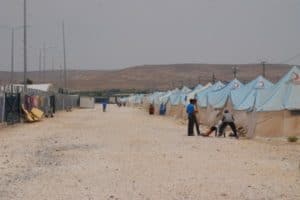This page contains affiliate links. This means if you a follow a link and make a purchase, at no additional cost to you, Humanitarian Careers will receive a commission. Thank you for supporting the site.
The NGO sector has a wide range of management roles. These senior level jobs oversee projects at country, regional and HQ level. They are ultimately responsible for ensuring NGO programmes deliver results. Managers within NGOs oversee large teams and are responsible for many key decisions.
If you’re interested in working for an NGO in a management role, we’ve put together this breakdown of some of the most common senior-level roles in the sector. We’ve also given details of what you need to apply to be a manager in an NGO.
Head of Mission
The role of Head of Mission is one of the top management jobs within an NGO. Responsible for oversight of all aspects of an NGO’s response, the Head of Mission is the most senior person within a country office.
With management oversight of programmes, logistics, finances, grants and security, the Head of Mission is responsible for ensuring the strategic direction of an NGOs work in-country. They directly manage the senior leadership team. They also have ultimate oversight of security within the country. The Head of Mission reports directly to the HQ or regional office.
How to Apply
To become a Head of Mission for an NGO you need to have several years’ experience in the aid sector. You will also need a number of years of field experience within management roles. A masters in NGO management or humanitarian response may be an asset, but most organizations will look for practical experience over formal qualifications. However, you will need strong knowledge of project cycle management, security and grants management to get a job as Head of Mission.
Field Coordinator
The Field Coordinator within an NGO is the most senior position within a field base. They manage day-to-day operations on the frontline of humanitarian and development projects. They are often-line managed by the Country Director or Head of Mission and in-turn manage the team at the field base.
As an NGO management position, the Field Coordinator is responsible for driving the programme forward in their location. They also ensure quality financial, logistics and HR procedures. The Field Co manages the day-to-day security at the base as well as staying regularly updated with developments in the context.
How to Apply
The job of Field Coordinator is a mid-level management position within the NGO sector. You will need some years of professional experience working with NGOs in order to become a Field Coordinator. A master’s degree in humanitarian and development work is beneficial, but not always required. Strong knowledge of security, logistics, and financial management is key, as well as programme cycle management.
Programme Manager
The job of Programme Manager within an NGO is to oversee the implementation of projects – either at specific field sites or within a technical function such as medical, shelter or nutrition. Programme Managers are responsible for developing workplans, ensuring project targets are met and ensuring programme quality.
An NGO Programme Manager is often responsible for grant management and reporting. They also feed into proposal development and help to secure additional funding. In most NGOs the Programme Manager line-managers the programmes team working on the frontline. Budget management is also a key part of many programme management roles.
How to Apply
To get a job as Programme Manager you will need up-to five years of relevant professional experience in the NGO sector. You will need a strong understanding of project cycle management, grant management and budgeting. If you want to work as a Programme Manager within a technical function, you will need formal qualifications in that area – such as being a doctor to be a medical Programme Manager.
Finance Manager
Finance Managers within NGOs are responsible for all aspects of finance across an area of operations. At field level, Finance Managers ensure adherence to financial processes, manage cash flow, have budget oversight and forecast expenses. They manage the finance team who assist coordination and field offices with making payments.
NGO Finance Managers at HQ level will often be responsible for finances across a number of countries. They will ensure compliance with internal and donor regulations, prepare and manage audits and provide assistance to country offices in budget management and financial implementation.
How to Apply
To work as a Finance Manager with an NGO you will need a formal qualification – often in accountancy or finance. A strong understanding of financial management in the non-profit sector will also be necessary. To get to management level in NGO finance departments you will also need some years of relevant professional experience.
NGO Management Online Courses
If you’re looking to work for an NGO in a managerial role, we highly recommend the online course Improving Leadership and Governance in Non-profit Organizations offered by the University of Buffalo, New York. This course shows how effective governance and managerial processes can be vital to an NGO’s success. Click the link for more information on the course.
Another course we think is great for those wanting to work as managers in the NGO sector is International Leadership and Organizational Behaviour offered by Bocconi University in Milan, Italy. It covers the key areas NGO managers are going to need in order to motivate their teams and create effective systems and processes in their organisations. Follow the link to the course’s page.
International organisations, including NGOs, often have complex management structures. They also work in challenging environments that require managers to adapt quickly to developments and alter their managerial styles. We think the online short course International Organizations Management by the University of Geneva is a fantastic addition to the CV of anyone applying to be a manager in an NGO. Click the link to enrol.
HR Coordination
The HR Coordinator within an NGO is the most senior member of the human resources team. Often line managing a team of HR Officers and recruiters, the HR Coordinator is responsible for overseeing the implementation of all HR processes within an NGO.
In an NGO, the HR Coordinator will ensure correct processes for HR are in-place, including for hiring, firing and disciplining staff. They will also oversee the pay-scale and design pay-roll systems. The HR Co will develop the salary scale for the NGO and have oversight of the conditions of employment – the guidelines that detail staff benefits, requirements and obligations to the NGO.
How to Apply
To get a job as a HR Coordinator with an NGO you will need several years’ experience as a HR professional. NGOs will ideally look for candidates with experience in the not-for-profit sector, however related experience in the private can be an asset. Formal qualifications in HR will also benefit you.
Supply Chain Manager
The Supply Chain Manager in an NGO has oversight of logistics and procurement. They are responsible for ensuring that the required supplies and equipment arrive where they are needed on time. The Supply Chain Manager will oversee a team of logisticians and procurement Officers. They will also often have ultimate oversight of the NGOs warehouse facilities.
The position of Supply Chain Manager is a key senior role within an NGO. Often sitting within the senior leadership team, the Supply Chain Manager may be responsible for all aspects of the NGOs supply chain within a country or sitting at HQ level may provide advice across many countries in a region.
How to Apply
To apply to be a Supply Chain Manager in the NGO sector you will need up to five years professional experience within supply chains and logistics. Experience is humanitarian and development sector will definitely be sought, but you can often supplement this with private sector experience as well. A formal qualification, such as master’s degree, in supply chain management is also an asset.
Security Advisor
The job of Security Advisor is one of the most senior management positions responsible or safety and security within an NGO. Many NGOs operate in unsafe and insecure environments. The Security Advisor will have a strong understanding of the local security context. They will also be responsible for developing tools and guidelines and ensuring security rules are followed at all times.
As a key management role within an NGO, the Security Advisor has responsibility for ensuring the safety and security protocols needed are in-place. Day-to-day security management is under the responsibility of the Field Coordinator or Head of Mission but providing the technical guidance and contextual overview needed to make the right decisions comes under the Security Advisor.
How to Apply
To become the Security Advisor for an NGO you will need a formal background in safety and security management. A deep understanding of the context the NGO is operating in will also be required. Experience in the private sector can be highly sought by NGOs recruiting Security Advisors, but at least some experience working in security for humanitarian and development agencies will also likely be needed.
Country Director
Country Director is another leadership role within an NGO, similar to the job of Head of Mission. Essentially, the Country Director role is the same but often overseeing a large range of programmes within a country. Bigger NGOs often have the role of Country Director instead of Head of Mission.
The job of the Country Director is to be responsible for all aspects of an NGOs work within a country. This includes oversight of programmes, grants, logistics, HR and finances. They will line manage the top positions in each department. They will report directly to the NGOs HQ or regional office.
How to Apply
To apply to be a Country Director with an NGO you need significant amounts of experience in the sector. Many NGOs look for ten years plus of relevant work experience when recruiting Country Directors. Extensive knowledge of NGO grant management, logistics, finance, project cycle management and team leadership are also all needed.
Grants Manager
Most NGOs are funded by grants they receive from donors. These include governments, international bodies, private companies and foundations. The job of an NGO Grants Manager is to oversee a portfolio of grants, ensuring the NGO remains compliant and that projects are implemented in-line with donor requirements.
The Grants Manager has overall responsibility for ensuring donor reports are filed correctly, that project monitoring and evaluation is completed and that the indicators for a programmes are being met. In many NGOs the Grants Manager also feeds into developing new donor proposals and assists with securing additional funding.
How to Apply
To work as a Grants Manager in an NGO you need a strong understanding of donors, their requirements and the processes of securing funds. If you want to get to management level within the grants team of an NGO you will need some years’ experience in the sector. A degree in a related field, such as NGO management or humanitarian action may be beneficial, but a proven track record of securing grants and working with donors is the most important requirement.
Regional Director
The job of Regional Director is a senior management role in the NGO sector. Large NGOs will have regional offices that oversee country programmes. The Regional Director is ultimately responsible for a NGOs work across the whole geographical area. Usually, in big NGOs, Country Directors and Head of Mission will report to the Regional Director.
The Regional Director is responsible for setting the strategic direction of an NGO within their region. They also report to HQ and network with other regions to ensure harmonisation across the NGOs country programmes. They will often directly manage the team within the regional office.
How to Apply
To become Regional Director in an NGO you need many years, often decades of experience. NGOs look for people with a wide range of management skills as well as expertise and knowledge of the geographical area and the context. A proven track-record of managing large-scale NGO projects at Country Director level is often required.
Communications Manager
NGOs use communications to convey their message to people. It is key for building the NGOs brand, promoting their work and raising funds. Communications for NGOs can also be a vital advocay tool. The job of the Communications Manager is to oversee the creation, development and dissemination of communication materials for an NGO.
The Communications Manager is often stationed in a country office or at HQ level. They will ensure that the comms materials being developed and used fit the NGOs core messages. They will also create the communications strategy. Within an NGO, Communications Managers often oversee a team of developers, creators and comms staff.
How to Apply
NGOs look for a mixture of creatively and experience when hiring communications staff. You will likely need formal qualifications in communications, but a proven ability to develop on-brand and effective campaigns will be the top priority. To get to management level, previous experience within the NGO sector would be beneficial, but private or public sector experience will also be useful.
Response Team Leader
When a new crises hits, NGOs need to establish programmes quickly to assist people. The role of Response Team Leader in many NGOs is to deploy into new emergencies and establish projects. They often move on after the programme is up-and-running and is handed over to longer-term staff. Most NGOs rotate Response Team Leaders between newly developing crises.
The job of the response team leader is to manage all aspects of the NGOs response. This includes setting up programmes and the logistics needed to operate. It can also mean working to secure funding and networking with other NGOs and government actors. The Response Team Leader is often the most senior member of staff in an NGO response office.
How to Apply
To work as a Response Team Leader for an NGO you will need several years of professional experience managing projects in the humanitarian and development sector. You will also need experience working in crises and emergency settings. Knowledge of NGO project management, security and donor grant funding will also likely be needed. Most NGOs will look for candidates with a masters in humanitarian action or crises management.
Head of Support Services
Support services within an NGO are functions that work to provide the programmes the staff and materials they need to operate. In most NGOs, support services cover HR, finance and logistics. Some NGOs include the grants and security teams under support services. The job of Head of Support Services in an NGO is responsible for managing the entire support services department.
With management oversight of finance, logistics and HR, the Head Of Support Services must ensure cohesion between these functions, as well as that the front-line programmes are receiving the staff, materials, equipment and finances they need on-time and in-full. The Head of Support Services is ultimately responsible for ensuring the NGOs programmes have what they need to achieve their targets.
How to Apply
Mostly only large NGOs have the role of Head of Support Services. In order to secure the role you will need practical experience in NGO logistics, finance and HR. Knowledge of grants and security will also help. Over five years of professional experience within the NGO sector is usually required. Formal qualifications in either finance, logistics or HR would be highly beneficial.
MEAL Manager
Within the NGO sector, MEAL stands for monitoring, evaluation, accountability and learning. It is how programmes are assessed, data is collected and analysis are completed to ensure the projects are meeting their targets. The position of MEAL Manager has overall responsibility for monitoring and evaluation systems, as well as conducting lessons learned and ensuring the NGO remains accountable to beneficiaries and donors.
The MEAL Manager will often oversee the MEAL team. This will include data collectors and Officer level staff responsible for MEAL in the field bases. The MEAL Manager will ultimately control the tools used to collect, input and analyze data, as well as feed into donor reports and SitReps by providing up-to-date and accurate data.
How to Apply
To become a MEAL Manager within an NGO you need a strong understanding of monitoring and evaluation systems used in the NGO sector. You also need to know how these impact projects and relate to donor reports and requirements. A background in data science or research would be an asset, but you will also need several years working on NGO projects, often in programmes or MEAL roles, to reach management level.
If you want to know more about how to get a job at an NGO, including in a managerial role, explore our page on the top NGO online courses here.





